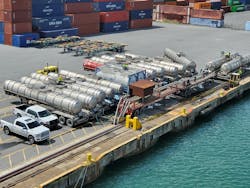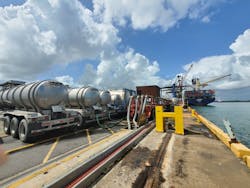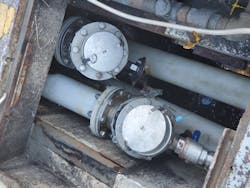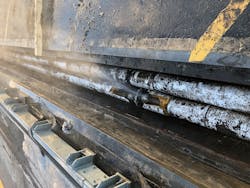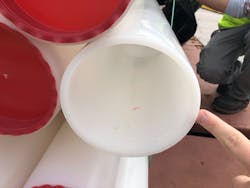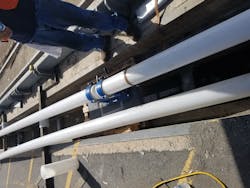Case Study: PVDF pipeline for fructose transportation
TOTE, the operator of a container shipping line, commissioned two container vessels incorporating tankage and systems to ship fructose from Jacksonville, Florida, to San Juan, Puerto Rico. But the company faced a problem following hurricane damage to its existing pipeline. The situation under review was that a two-year-old 316 stainless steel pipeline had been severely corroded by saltwater conditions. Thus, TOTE had to consider what other options for corrosion-resistant materials were available for the piping systems.
TOTE specializes in operation of the world's first LNG-powered containerships put in service between Jacksonville, Florida, and San Juan, Puerto Rico, and operates a fleet of roll-on/roll-off cargo ships between Tacoma, Washington, and Anchorage, Alaska. Jim Wagstaff, vice president of operations, and Nic Zoretic, director of operations, led the materials replacement project for the new pipeline, which was completed in September 2020. Figures 1, 2 and 3 depict the ship offloading fructose, the pipeline runs from the vessel to tankers and the connection from the pipeline to the truck manifold, respectively.
To help guide the decision-making process, TOTE called on Bulk Solutions, an engineering consulting expert in the bulk distribution industry. Bulk Solutions was commissioned to make a recommendation for the material replacement project. And Bulk Solutions had to make several considerations before choosing a preferred material for the fructose piping system. Faced with an early failure of the 316 stainless steel run of piping due to corrosion from the marine environment, Breck Reed, president and CEO of Bulk Solutions, reviewed other material options while trying to better understand the incumbent material.
The research from Bulk Solutions indicated that Kynar PVDF piping could meet the criteria of FDA compliance, high-temperature cleaning, saltwater resistance and complete system availability. Bulk Solutions then partnered with Simtech Process Systems to prepare a complete quotation for the engineering of this project. Simtech Process Systems provided complete system fabrication, specification draft and installation training.
After review between TOTE, Bulk Solutions and Simtech Process Systems, the decision was made to install the entire 2,200 feet of butt-fused piping made with Kynar PVDF fluoropolymer. Mark Williams, senior engineer for technical service at Ingredion Incorporated also worked to approve the final product. Ingredion Incorporated is a global ingredient solutions company making sweeteners, starches and unique ingredients from plant sources. The company delivers ingredients, such as fructose, to end users and was highly satisfied with the design that all three companies provided.
Stainless steel replacement
Major concerns for this project went beyond the product being transported. When choosing material initially, stainless steel was selected for its product compatibility with fructose. However, this piping failed after two years due to external corrosion from saltwater in the surrounding environment. One danger of using metal piping at shipping docks is the accelerated corrosion that occurs from the marine environment.
Beginning after two years of service, concerns and complaints regarding product shortfalls began to arise. First inspections did not uncover an obvious problem, but later inspection via pressure testing showed the line was failing to hold pressure. Upon pressure testing of the pipeline, evidence of corrosion was observed in the form of numerous pinhole leaks throughout the entire line. At this point, Bulk Solutions and TOTE decided to reevaluate what would be the best choice of a piping material. Figures 4 and 5 depict the 316 stainless steel before and after corrosion.
Why Kynar PVDF?
Plastic was chosen over metal due to the exterior conditions imparted by the salty ocean front. Kynar PVDF was chosen not only for its product compatibility with fructose but also because it does not corrode over time and is UV resistant. Portions of this piping would be readily exposed to the marine environment and direct sunlight in Puerto Rico, thus Kynar PVDF offered a viable replacement material. Figures 6 and 7 illustrate the new Kynar PVDF pipe and its installation.
Approximately 60% to 70% of the fructose industry consists of large bottlers, with the remaining amount being used by small bottlers, bakeries, candy manufacturers and pharmaceutical processors, all of which require FDA compliance.
Additional reasons for selection of Kynar PVDF include its strength, lightweight qualities and smooth interior surface. Kynar PVDF, since it is a fluoropolymer, is well known for its chemical resistance, which includes the continuous use of fructose. The cleaning process for this piping is accomplished by a water flush at ambient temperature followed by sanitization at 180°F (82°C) for 15 consecutive minutes. Since Kynar 740 polymer is UL RTI-rated to 302°F (150°C), the sanitation requirements do not pose a concern to the long-term life of the piping system1. Contrary to metals, Kynar PVDF can be fabricated safely without the concern for sharp edges, and polymer piping systems are natural insulators.
A key capability of Simtech Process Systems is its ability to offer valves, connections and other components, all in the same polymer, regardless of the polymer chosen for an application. This project required a seamless system using as many as 100 fittings and 2,200 feet of 6-inch ID piping. By choosing Kynar PVDF, in this case, there will be significant savings in annual maintenance due to the expected longer life of the product.
“A beverage industry first has been completed with the commissioning of the Kynar PVDF fructose pipeline in San Juan,” Zoretic said. “A year-and-a-half of materials testing, design, engineering and construction have culminated in restoring efficiency and safety to the bulk fructose trade in San Juan.”
Reference
- 1. UL Yellow Card, Arkema Inc. Kynar PVDF Products.
Steve Mutton has been the vice president of sales at Simtech Process Systems since 2015. He has 27 years of experience at Simtech in application sales.
Alexandra Peters received her B.S. in chemical engineering from Villanova University in 2020. She works for Arkema Inc. as a marketing and end use applications engineer for the Fluoropolymer division. She was recently recognized by the International Association of Plastics Distribution (IAPD) for completing the IAPD Performance Plastics Level I Certificate Program. She can be reached at [email protected].
About the Author
Steve Mutton
Vice President of Sales at Simtech Process Systems
Steve Mutton has been the Vice President of Sales at Simtech Process Systems since 2015. He has 27 years experience at Simtech in application sales.
Alexandra Peters
Marketing and End Use Applications Engineer for the Fluoropolymer Division, Arkema Inc.
Alexandra Peters received her B.S. in chemical engineering from Villanova University in 2020. She works for Arkema Inc. as Marketing and End Use Applications Engineer for the Fluoropolymer Division. She was recently recognized by the International Association of Plastics Distribution (IAPD) for completing the IAPD Performance Plastics Level I Certificate Program.

